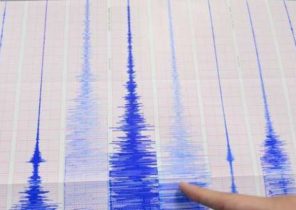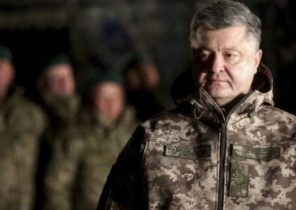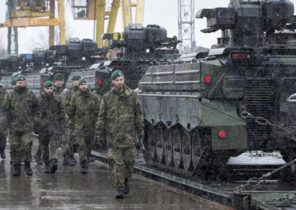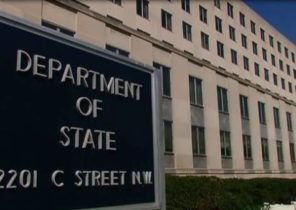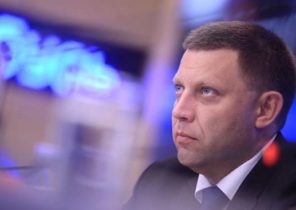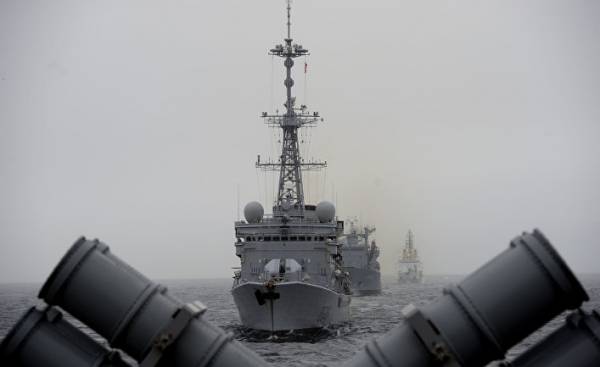
Russia’s annexation of the Crimean Peninsula in 2014 contributed to the fact that relations between Norway and Russia have become increasingly tense. This event is in many respects also became the starting point of all the outrage that Russia expresses in relation to Norway.
In spite of that, Norway in the following years has taken some measures. According to the researcher Russia Yakub Godzimirski (Jacub Godzimirski) from the Norwegian foreign policy Institute (NUPI), the “Russian” policy of Norway is especially influenced by the following points:
• The principle of deterrence.
• The policy of reassurance.
• Participation policy.
American soldiers in Varese (Værnes)
If you start with the first: the inability of Norway to confront a superpower, like Russia, has led to the fact that Norway joined in 1949 to NATO and has since been a loyal member of the Alliance.
The second item, “policy of reassurance”, says that Norway is pursuing a policy which aims to reduce the level of tension.
“This means that Norway does not hold on the border military exercises, not placing in the country of foreign armed forces, and also the fact that Norway has no nuclear weapons,” says Godzimirski.
It is here that we are confronted with the fact that Russia perceives as a clear violation of the fact that for many years it was Norwegian policy. Now Vernese placed 330 American soldiers, and Russia presents it as a violation of those principles, which, on its own initiative Norway has maintained its post-war history.
When Russia says the action of Norway, it often refers to a policy of reassurance and says that what makes Norway constitutes a violation of the Norwegian principles.
“But it is important to remember that the policy — a restriction that Norway herself imposed. With Russia on this subject no agreement was not. The decision to build its NATO membership subject to such restrictions, took the Norwegian government, and to change such restrictions can only Norwegians,” — emphasizes Godzimirski.
The desire to reassure NATO allies
In addition, Norway in may sent 208 soldiers to Lithuania, within the framework of measures that NATO is taking to collective defence and deterrence.
“After 2014, there is a need to reassure not only Russia, but also NATO.”
“The debates showed that the task designed to reassure NATO allies, while the need to appease Russia, has become less,” said Godzimirski.
Tour Bukkvoll (Tor Bukkvoll), senior researcher of the research Institute of the Norwegian Armed forces, says the Russians throughout its history believed that Norway treats them more pragmatic than other countries.
“It is possible that this image is still preserved, but it is weakened”, — believes Bukkvoll.
Both experts agree that the outrage expressed by Russian, heavily symbolic, although they do not miss a chance at every opportunity to Express it. But here is the possible Norwegian participation in the missile shield NATO can really bring Russia out.
In may Klassekampen told about the secret report of the air force, which recommended either make Norway part of the missile shield NATO, or to invest in creating your own Norwegian anti-missile shield.
“If Norway will participate in the missile shield, then the irritation will be much more genuine. I’m not saying that any other irritation isn’t real, but it is not so strong,” says Buckwell.
— How Russia might react to such a move?
— They will not be able to do anything, only threaten. They will not to use military force against member countries of NATO. But they raised a lot of political noise, and perhaps they will threaten the redeployment of forces.
The desire to “liberalise” Russia
Godzimirski emphasizes that all three factors, i.e., American soldiers in Varese, the presence of Norway in Lithuania and possible anti-missile shield, affect how Russia sees Norway.
“These are things that Russia uses in its communications with Norway. These are the moments that cause irritation. Really if the Russians are concerned, is another matter,” he says.
The last Central point, which Godzimirski highlights of the Norwegian policy towards Russia, the policy of engagement, when Norway, in particular, materially contributed to the solution of environmental problems on the Kola Peninsula, and also went to the expansion of human contacts in the border areas.
Thus Norway expects that Russia will become more liberal and democratic.
“As for this dream, then Norway will have to wait a bit,” — said Godzimirski.
Cross-border cooperation
When we talk about expanding cooperation in the border areas in the North, here we are talking about the “identity of the residents of the border areas”, which allows visa-free travel from one country to the people living not further than 30 kilometers on both sides of the border.
The certificate is valid for the region of Sør-Varanger (Sør-Varanger), located in 30-kilometer zone from the Russian-Norwegian border, for example, Kirkenes, and areas such as polar and Korzunovo, and partly of areas of Nickel and Pechenga which lie within a 30-kilometer zone from the border to the Russian side.
Norway hopes that such cooperation, as it will help to change Russia in the “Norwegian” direction.
As for the residents of Kirkenes, cross-border cooperation is developing well, says the mayor, rune Rafaelsen (Rune Rafaelsen).
“In Europe it is only here and work, it’ll work here every day in practical tasks. This cooperation for the benefit of people, and it’s incredibly important stabilizing factor,” says Rafaelsen who isn’t frightened by the big neighbour in the East.
“Fear of Russia is directly proportional to the distance from Storskog” (Storskog, the Norwegian-Russian border, approx. ed.).
